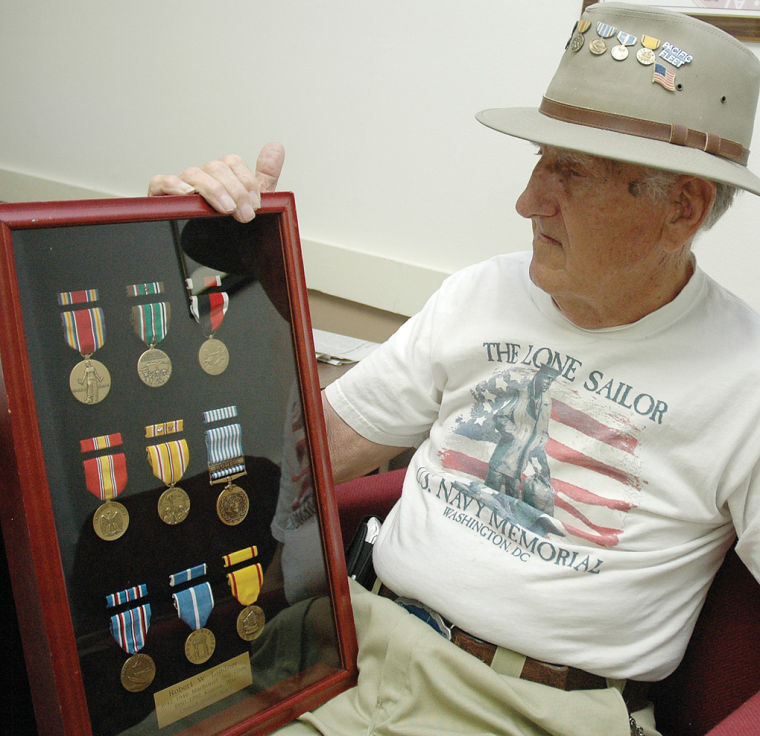Navy crewman loses hearing in Iwo shelling
Published 8:09 pm Friday, June 16, 2006

- World War II Navy veteran Robert Lindner, 80, enjoys sharing stories of his war years aboard the U.S.S. Capps.
World War II Navy Machinist Mate 2nd Class Robert Lindner fought the Veterans Administration for decades, trying to get the agency to pay for a hearing aid.
Lindner lost hearing in one ear from a misfiring accident of the U.S.S. Capps’ 5-inch guns during the shelling of Iwo Jima.
“I finally went out and bought my own hearing aid for $3,000,” he said. “Right after that, I was classified as a disabled veteran.”
But Lindner’s problems with the VA, which resulted from a technicality having to do with him not immediately seeking medical treatment after the accident—an impossibility under the circumstances—did not embitter him against the military or the nation he went to war to defend.
For the past three years Lindner, 80, has driven to Washington, D.C., to take part in Memorial Day services at the World War II Memorial. Lindner said this year his granddaughter and son went along to take turns driving because, “They think I have a tendency to run off the road,” he said.
Lindner, whose postal address is Toney, prefers to say he lives “on Alabama 251 near Thach Road” so his friends can find him more easily. It was one day after he turned 17 on Nov. 5, 1942, that he joined the Navy.
“I was sent up to Great Lakes for training and went to a machinist’s school that belonged to Ford Motor Company in Dearborn, Mich.,” he said. “I was taught to light boilers and make steam.”
Baltimore native Lindner, the son of a brewery worker, became a Machinist Mate 2nd Class at 17 1/2. “I was probably one of the youngest in the Navy,” he said.
Lindner was assigned to the U.S.S. Capps, a 21-ton destroyer that saw service in both the Atlantic and Pacific theatres. Commissioned at Chickasaw, Al., on June 23, 1943, the U.S.S. Capps accumulated 170,000 miles of wartime cruising and participation in every major campaign in the Central Pacific from the Marshalls to Okinawa without suffering a scratch or losing a man to enemy action.
Lindner remembers that the Capps had been at see for 87 days before pulling into port for supplies.
“We had a big time in port and were ready to move on to the Philippines and Leyte Gulf when we looked up and there came a big LST. They dropped down the front and out came Gen. Douglas MacArthur. I swear we thought he walked on water.”
The U.S.S. Capps arrived at Iwo Jima three days ahead of the Navy invasion. Their demolition teams went in to blow up underwater mines before the landing.
“My job was to be on this speed boat that was a raft and we pulled men back into the rafts. I wasn’t qualified to go underwater. I could dogpaddle, and that was about all.”
After the battle began, Lindner also took LSI inflatable tenders out to remove the wounded from destroyers for transport to medical ships.
“We had to go below decks to get people out—some were alive, some were dead.”
The Capps had five guns—two in front and three in back. The front guns worked in synchronization, one firing then the other but never together, said Lindner.
Lindner’s job was to gather spent cartridges off the deck so they didn’t get jammed under gun housings when they swung around.
“Both of the front guns went off at the same time and he concussion knocked me 30 feet,” he said the boson grabbed me or I would have gone into the drink.”
The vibration of both of the big guns firing simultaneously had blown open a hatch that had also struck Lindner in the head, contributing to his hearing loss.
“They only had pills, Band-aids and aspirins in the dispensary,” he said. “They couldn’t afford to take one sailor to a hospital ship.”
And therein lay the problem with the VA, according to Lindner. The agency said he was too long in seeking assistance for his service related injury. “I really got man when I couldn’t hear my grandchildren.”
But despite losing most the hearing in his right ear, Lindner joined the Merchant Marine seven months after getting out of the Navy on Dec. 31, 1946.
“I stayed on a Merchant Marine ship until November 1950, and then Harry (President Truman) found me. I had to find my way back and turn in for duty in Korea. I went from making $1,200 a month to $190.”
Back in the Navy, Lindner was aboard ship serving as backup for the Marines at the Chosin Reservoir. At Inchon, he loaded civilians “packed like sardines” to transport them away from the fighting.
After the war, Lindner went to work for the Baltimore Signal Depot where all Signal Corps equipment was maintained. He learned to work on photographic equipment and went on to work at Eglin Air Force Base on top-secret equipment used on U2 spy planes. After Eglin, where he resigned because “someone was always looking at me,” he went to Redstone and got a job in maintaining camera systems for missiles.
He retired from Redstone in 1985. A widower, he divides his time between visiting his three daughters and grandchildren.





